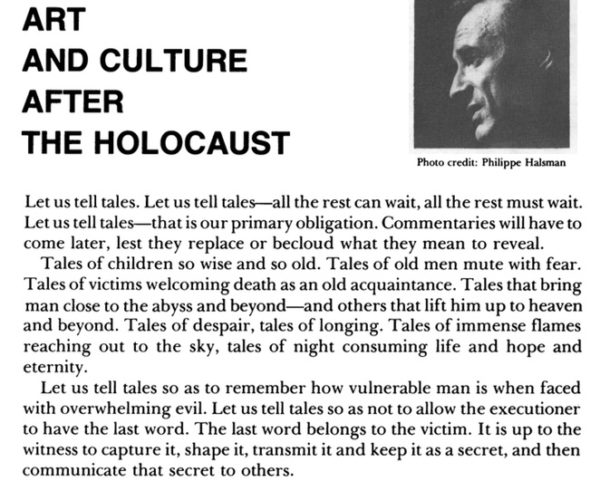Words of the Week: Elie Wiesel
I went in search of these words after I heard Sir Ben Kingsley read them from a paper he took from his jacket pocket at the beginning of a discussion that followed a preview screening of “Operation Finale” here in New York on Monday evening.

Image description: opening paragraphs of Wiesel’s address, accompanied by a photo of Wiesel (credit: Philippe Halsman). The text reads:
Let us tell tales. Let us tell tales—all the rest can wait, all the rest must wait.
Let us tell tales—that is our primary obligation. Commentaries will have to come later, lest they replace or becloud what they mean to reveal.
Tales of children so wise and so old. Tales of old men mute with fear. Tales of victims welcoming death as an old acquaintance. Tales that bring man close to the abyss and beyond—and others that lift him up to heaven and beyond. Tales of despair, tales of longing. Tales of immense flames reaching out to the sky, tales of night consuming life and hope and eternity.
Let us tell tales so as to remember how vulnerable man is when faced with overwhelming evil. Let us tell tales so as not to allow the executioner to have the last word. The last word belongs to the victim. It is up to the witness to capture it, shape it, transmit it and keep it as a secret, and then communicate that secret to others.
Thanks, Erika, for this. So powerful.
Thank you so much for sharing. I heard Ben Kingsley read this and had to have a copy. So powerful and so necessary. We must all be storytellers!
Thank you!
Just heard Sir Ben Kingsley read this and did a search for it. Thank you for posting this.
Best To You.
I’m so glad to help others who found Sir Ben’s recitation as moving as I did.
These words, while haunting, should inspire readers, writers, educators and librarians. Our work, whether it be to tell tales, transmit tales, or make tales accessible, is vital.
Yes.
Thanks for finding this. I heard it on NPR this morning and wanted to post it in my classroom.
Ah, so that explains the new wave of interest. Thank you for telling me. I’ll go find that segment now.
I did the same, Dan. Many thanks to Erika.
I heard it as well and have the same plan for my English classroom.
https://www.npr.org/2018/08/29/642645179/in-operation-finale-ben-kingsley-summons-the-evil-of-a-holocaust-architect
I am facilitating a thorough review of the insightful and telling “The Warmth of Other Suns,”a narrative fiction by Isabel Wilkerson that chronicles the migration of over 6 million African Americans between the years 1915-1970 and the atrocious conditions they were fleeing in the South. I plan to share these words with the book club for they apply to the black experience here in the USA.
That’s an important book (I think you meant to write “narrative nonfiction,” though–it’s an historical account, but not a fictional one).
That is what I get for failing to proof read. Yes, narrative non-fiction.
And now, three years have passed, I heard Ben Kingsley on what I assume to be a repeat of the same programme, such power. In the time between the world has changed in so many dramatic ways, the telling of tales however remains of equal importance, perhaps even more so. Thank you Erika
Thank you, Peter.